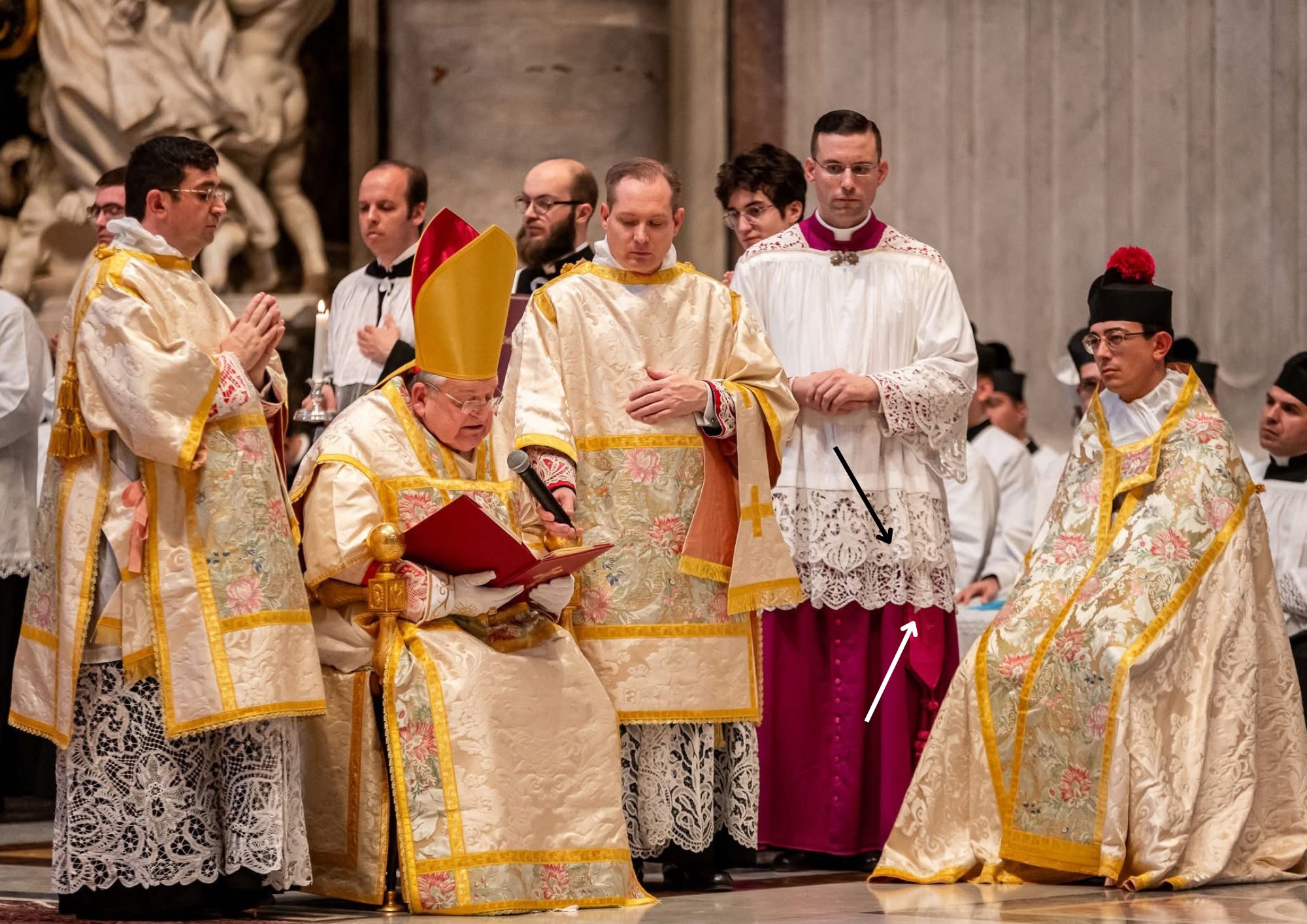In recent days, a video has circulated showing a parish priest of the Archdiocese of Milan who, at the end of Holy Mass, publicly mocked a group of faithful who had traveled to Rome to take part in liturgical celebrations according to the Roman Missal promulgated by Saint John XXIII in 1962, inside St. Peter’s Basilica.
The episode - serious in itself - becomes even more disturbing given the context: the Eucharistic celebration, the very place where the Church recognizes itself as one body. And yet, precisely there - on the altar of communion- the voice of division was raised. Once again, we witness a manipulation of the liturgy, turned into a battleground and a source of scandal, even for the faithful. Once, such tensions remained confined to clerical parlors, suffocating and self-referential; today, they spill into the ecclesial community, as if someone were trying to recruit an army for their own private wars.
This episode goes far beyond mere imprudence: it exposes a deep wound in contemporary ecclesial culture, one that drives some to use irony as a shield, the liturgy as a stage, and words as instruments of power. It is an ancient dynamic, present both in modernism and traditionalism, but today it has taken on exasperated forms, leaving the clerical enclosures to infect even the People of God, drawn into logics of mockery and opposition that should remain far from the mystery of faith.
The Role-Play: Those Who Wound and Those Who Hide
It is hardly surprising that those who utter such remarks are often the same who, in their parishes, foster division, create a tense climate, and make life difficult for anyone who does not conform to their views. Often, these attitudes go hand in hand with the tendency to welcome problematic or controversial figures - people known for their arrogance or instability, previously expelled from convents (and earlier still, from seminaries), now “rehabilitated” in some distant Milanese parish, where they teach religion following the familiar pattern: kicked out through the door, re-entering through the window.
Behind the mask of pastoral zeal often lie fragile personalities driven by a need for control. From a psychological point of view, public irony used to belittle others is a narcissistic defense mechanism: it serves to remain at the center of attention, to appear superior, to elicit approval, while avoiding any genuine self-examination. As Erik Erikson would put it, it is a “regressive mechanism of identity” - the mockery of another as a way to reinforce a shaky self-image.

The Profanation of the Sacred
Sacrosanctum Concilium reminds us that the liturgy is the “supreme sacred action”, the beating heart of ecclesial communion. To turn it into a space of ridicule means to profane what unites, reducing the mystery to a mere performance. But no less serious is the behavior of those who attend celebrations wearing vestments that do not belong to them, or who spend their time judging the priest for how he celebrates, what he says, or even how he dresses. There are even those who arrive in Rome flaunting two surplices as a badge of distinction - as if the liturgy were a stage for exhibition, not the silent place where God becomes present.
The liturgy must never become the refuge of unresolved identities or clerical vanities. If we fail to understand this, it will be the people themselves-tired of these caricatures of the sacred - who will remind us, and not gently. Saint John Chrysostom warned: “He who mocks a brother offends Christ Himself.” And Saint Augustine added: “Do not mock one who falls, for you may fall worse than he.”
Behind a priest’s bitter joke lies, therefore, an anti-liturgical act, because the Eucharist is born of humility, not derision. The Holy Father, on multiple occasions, has condemned “verbal violence within the Church”, describing it as a sin against communion. It is the language of those who use words not to proclaim but to wound; and when this happens during Holy Mass, the wound affects not only the listener, but the very Body of Christ.
The Scandal of the Simple
The People of God, often unaware of clerical dynamics, perceive only the result: scandal. As the Catechism teaches (no. 2284), scandal is behavior that leads others into sin. Today, sin often takes the form of indifference: the believer who withdraws, wounded by cynicism, whether from lay ministers or even clergy, who stops believing in the goodness of those who preach. The ironic smile of a priest thus becomes a breach in the heart of the Church, a sign of lovelessness that drives away rather than converts.
The Psychological Root: Fear of Confrontation and Spiritual Envy
Many forms of mockery arise from disguised envy. In the ecclesial world, this envy concerns not material goods, but the grace that radiates from another. One mocks those who pray differently, who attract people, who show enthusiasm. Behind such irony hides the need to devalue what one lacks - a symptom of unacknowledged emotional fragility that, repressed, re-emerges as sarcasm and superiority. The result is a Church laughing at itself, without realizing it is weeping.

The Decay of Language and the Arrogance of Intellectuals
A similar and equally troubling phenomenon belongs to the same logic: the inability to engage with arguments, replacing reason with insult. It is the degeneration of certain academic and ecclesial circles where, instead of discussion, there is attack - whether in liturgical debates or broader discourse. Here too, the divide does not follow labels: modernists and traditionalists mirror the same weakness. When one loses the ability to reason or question oneself, there follow innuendo, slander, and attempts at delegitimization. If a newspaper publishes an investigation: “Ah, they’re friends with that prelate, who knows…” If it exposes unhealthy dynamics: “Where did they get their documents?” If it tries to explain the complexity of a situation without reducing it to sides: “Ah, they must be pushing some hidden agenda…” Unable to bear the weight of truth, attention is diverted toward the other. This is the climate we have sadly grown used to in the Catholic Church: a place where words no longer illuminate, but divide; where reasoned discourse yields to suspicion. That is why we remain stuck in our quicksand, unable to build a free and mature thought. That is why young people drift away, tired of a language made of accusations instead of ideas. And that is why, within our ranks, true thinkers no longer arise - only factions looking for enemies. And those who flaunt titles - the professors who spend their days on social media instead of in books - are the first to confuse debate with denigration.
In recent hours, Andrea Grillo insulted Massimo Franco for writing an article about the traditionalist event in Rome. Instead of engaging with the substance and enriching the discussion, Grillo gave in to contempt: “A full page of Corriere filled with lies. But the journalist, intoxicated by the drug of salons, falls into the trap of a craftier yet equally unprepared colleague... Massimo Franco understands liturgy as much as Bruno Vespa understands tennis.” A language unworthy of those who seek truth, but typical of those blinded by hatred and ideology. After all, when it comes to liturgy, no one understands anything - except him, the self-proclaimed expert.
And the bishops? They keep inviting him, because if you spread venom from the “right” side, you are welcome; but if you invite people to think, to reflect with freedom and measure, you become inconvenient.
The same applies to Alberto Melloni, long accustomed to violence and verbal arrogance. Referring to a group he criticized, he even dared to write: “Does manure smell nice when it hits the fan?”
Words that require no comment - they speak for themselves, revealing the decay of those who, though tasked with shaping consciences and guiding thought, have lost all sense of measure and charity. When intellectual debate degenerates into insult, we are no longer dealing with a diversity of opinion, but with a human and spiritual failure.
For a Purification of Ecclesial Language
Perhaps today the true reform of the Church does not pass through documents or rites, but through the way we speak - of God and to one another. Every time speech becomes derision, grace withdraws. Every time a priest laughs at fellow clergy or the faithful, or a theologian mocks a colleague, charity dies a little. Only those who learn to be silent before the mystery can truly speak with truth. And perhaps, before an altar or a lectern used to mock, the most Christian response is not to retaliate, but to kneel - and ask forgiveness, even for those who no longer know what they are doing.
d.A.S.
Silere non possum